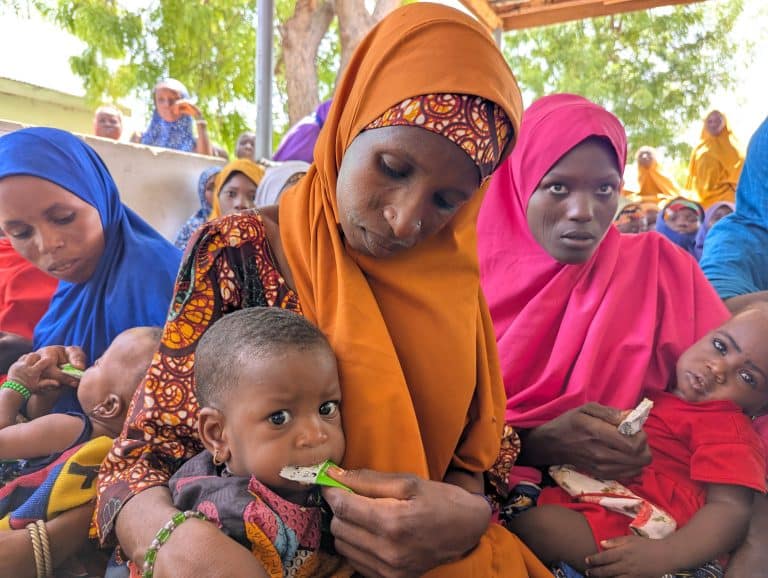Dressed in a blue gown, a pair of rubber boots and protective cleaning gloves, he is responsible for disinfecting anyone leaving the treatment center’s “red zone,” the highly-contagious area where patients are cared for in isolation. His face is camouflaged behind a surgical mask, but his eyes show strength of character. It’s a strength of character that allows him to come to work every day to give out undressing instructions to his colleagues, while spraying their protective equipment with chlorinated water.
“I’m an essential part of this process,” says Soullo, smiling.“I give the undressing instructions to guide my colleagues, and I know how to stay calm, even if some colleagues are tired after a day or night’s work.”
Soullo’s role is particularly important because he is the link between the “red zone,” which is contaminated, and the “green zone,” outside the building. Every day, he assists more than 100 health workers as they leave the “red zone.”
Behind him stands a man, smiling and discreet. Fara Gabriel Tinguiano, 35 years old, is the leader of the team of hygienists, of which Soullo is a member. Fara, known as “Papa Charly” within his team, supervises the activities of the internal and external hygienists in one of the treatment center’s buildings.
“The teams of hygienists working inside the building are responsible for cleaning the floors, managing the garbage cans, cleaning the showers, terraces, walls, windows, and taking care of the bodies in case of death,” says Papa Charly. “As for the external teams, they are responsible for picking up waste and transporting it to the storage area, cleaning the floors, and filling the tanks at all handwashing points outside the center.”
The two men know each other well. Trained as agricultural engineers, they met in 2014 during an internship at the agricultural direction of the Guéckédou prefecture, in the Forest region of Guinea.
When the Ebola epidemic hit Guinea that year, the town of Guéckédou was the first to be affected by the disease. Humanitarian organizations had to recruit and train staff quickly. The skills of Soullo and Papa Charly, as well as their experience in mastering sprayers, enabled them to participate in the response as hygienists. “The sprayers used in agricultural settings and those used to disinfect the protective equipment of health workers during an outbreak work in much the same way,” Soullo says.
In April 2020, when the first cases of COVID-19 were recorded in Guinea and ALIMA began to support the National Health Security Agency in the management of patients, Papa Charly was the first to respond.
“I was at home in Kissidougou [570 kilometers from Conakry]” he says, “when friends called me to tell me they were looking for hygienists in Conakry. Many encouraged me to apply, telling me that they would be reassured if they knew I was part of the treatment center team. I hit the road the same day.”
A few days later, when Papa Charly joined the ALIMA team at the Donka treatment center, he was surprised to see Soullo arrive.
“I was very happy when I saw that Soullo was on my team,” he says. “I immediately assigned him to the disinfection station at the undressing area because I knew he could start working right away. He knows how to mix the disinfection solution and he knows the steps involved in undressing. One can only agree with Papa Charly’s comments: when we observe Soullo at work, we immediately see that he is a master at what he does. And that he wouldn’t hesitate to call to order anyone who didn’t respect the safety protocols!
While the men admit that they were very afraid at the beginning of the COVID-19 epidemic when they saw the impact of the disease on other continents, they are now reassured to see that the treatment centers are able to take care of all confirmed patients. What motivates them on a daily basis? Participating in the fight against the epidemic and serving their community.
“Humanitarian aid has become a vocation for us. Once we have defeated COVID-19, our wish is to continue to help the communities,” conclude the two men.
————————-
This article was produced with the financial support of the European Union. Its content is the sole responsibility of ALIMA and does not necessarily reflect the views of the European Union.





